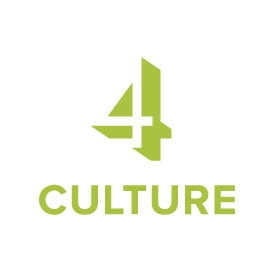About myself:
I was born and raised in Solothurn Switzerland. I always liked making things; my mother was very creative and our family traveled throughout Europe. My creativity was encouraged and developed further through my later school years at a Waldorf School, where I graduated. That's where I got hooked on stone. I needed to make a hand mill for a graduation paper. I bought some marble from the local stone sculptor, borrowed some tools from school and set to work in my parent's garage. The mill turned out great and produced some fine flour.
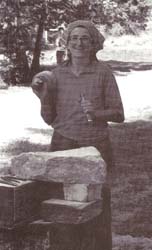
I really enjoyed the challenge I felt while trying without any guidance - to shape these two stones into a mill. In Europe you can learn to be a professional stone sculptor by taking an apprenticeship program and this is what I did.
The apprenticeship included art school and on-thejob training, the latter meaning working nine-hour days! The first two years of the apprenticeship was completely hand tool work, to cultivate an intimate knowledge of the tools and materials. This "handson" education gave me a great foundation to work from. I was able to work with different materials and learn everything, from sculpting relief and three-dimensional work, to making gold foil and lead lettering to making my own forged tools. In art school I was taught, among other stone-related topics, basic design principles, calligraphy, architecture, and basic geology, as well as bookkeeping for small businesses.
After receiving my papers as a "Steinbildhauerin", I spent a year traveling in North America, particularly Canada, where I met my husband. I finished my travels and went back to Switzerland to continue working as a Professional Sculptress, but returned to Canada to marry and settle on Thetis Island, a small Gulf Island off Vancouver Island, British Columbia.
Since then, my husband and I have built my studio and our house and had two children, now 4 and 9 years old. I home school my children which doesn't leave much time to sculpt. But right now my family is more important to me and I feel I still will have enough time to sculpt once they have left home. So for now, I get to sculpt like a maniac one day a week while our neighbor comes and teaches the kids.
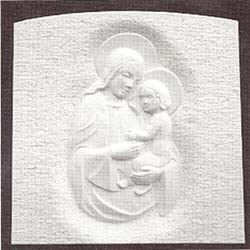
I have been an instructor at the first three Canadian Symposia, and two Symposia on Whidbey Island, as well as the organizer of the Canadian Symposia for the last two years -all of which have been sponsored by the NWSSA. I have enjoyed the opportunity to share and learn from the other sculptors I have met through this forum. I think the NWSSA is a valuable organization for exchange and support for both the beginner and professional sculptor.
About my work:
In my work, I enjoy the challenge of bringing the tender images which live within my mind out of pieces of stone, I work primarily with marble, granite, and sandstone. I would describe my work as being playful, having simple flowing forms, open to interpretation, portraying feelings and moods. Commissioned works are exact and precise, portraying the client's ideas rather than mine. Aspects of my life are also reflected in my work, such as: energetic, analytical, independent, practical, philosophical, and spiritual. I am a practical sculptress, less is often more for me. I consider my work well thought out and disciplined, more calculated than free form. I use texture rather than detail, and prefer form in place of polish.
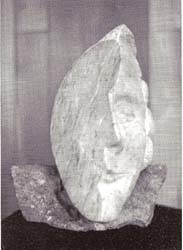
How I go about my work:
Most often I get ideas from the shape of the stone. If you look at the picture of the "Zephyros", the flat side was already in the stone, all I had to do was to make it smooth
and polish it. If I don't get any ideas from the stone I sometimes will take a big hammer and bang some corners off: this will change the shape enough so I can see something in it.
Of course, if I have a commission I work differently. Ifit has to be something specific, I make a model out of clay and produce a plaster of paris mold and positive from it so the customer can approve it before I cut into the stone. Otherwise I will simply sketch the design on the stone and start to work. I also do commissions for grave markers and because I don't sandblast them they all look unique. For this work I use the air hammer to chisel out the letters and relief, but it takes practice to get those letters all straight doing it free hand!
I prefer working with hand tools, although they scem to be slower than the power tools. I can work with hand tools all day, whereas the power tools are very strenuous for my body and I have to quit much earlier than with hand tools.
The tools I use are different from what most people here are using. I have a big round wooden mallet similar to the carpenters mallet but bigger (it weighs about 2 pounds). I also have a big bushing hammer which I use for all kinds of things. Because I can't find these kinds of tools here I get them specially from Europe.
I have recently been given a few chunks of stone and I didn't recognize what they were, even after working with them. I found out, thanks to George Pratt, that they are onyx. I found it to be very different to work with; it would flake rather than chip and was very unpredictable. At the beginning I was very careful not to work it too thin, but then I got bolder and found out that that I can work it quite thin.
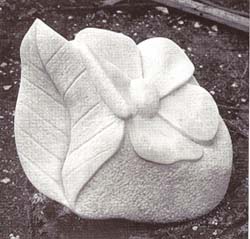
This spring I won a public art competition for the Municipality of Whistler. You can see the material waiting to be worked on in the picture of my studio (photo above left). That's what I am working on right now. It is a wheelchair accessible drinking fountain made out of Vancouver Island marble, standing about three feet tall and measuring three and a half feet long. It will be installed in Whistler in the spring of 2000.
One thing I would like to mention is the size of my studio: it measures about 10' x 10 '. Why do I mention this? Because so often people imagine all sculptors have these great big places to work in and exhibit their work. Sometimes one feels like you can't create without a big work area, but although I must admit it is nice to have space - it is not necessary in order to create beautiful work. Heres to all of us who work in a garage, the basement or the re-modeled wood shed next to our house!
Happy sculpting,
Simone Weber-Luckham

